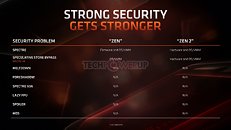- Joined
- Oct 9, 2007
- Messages
- 47,435 (7.51/day)
- Location
- Hyderabad, India
| System Name | RBMK-1000 |
|---|---|
| Processor | AMD Ryzen 7 5700G |
| Motherboard | ASUS ROG Strix B450-E Gaming |
| Cooling | DeepCool Gammax L240 V2 |
| Memory | 2x 8GB G.Skill Sniper X |
| Video Card(s) | Palit GeForce RTX 2080 SUPER GameRock |
| Storage | Western Digital Black NVMe 512GB |
| Display(s) | BenQ 1440p 60 Hz 27-inch |
| Case | Corsair Carbide 100R |
| Audio Device(s) | ASUS SupremeFX S1220A |
| Power Supply | Cooler Master MWE Gold 650W |
| Mouse | ASUS ROG Strix Impact |
| Keyboard | Gamdias Hermes E2 |
| Software | Windows 11 Pro |
AMD in its technical brief revealed that its Zen 2 microarchitecture has hardware mitigation against the Spectre V4 speculative store bypass vulnerability. The current generation "Zen" and "Zen+" microarchitectures have OS-level mitigation. A hardware mitigation typically has less of a performance overhead than a software mitigation deployed at the OS or firmware level. In addition, just like older generations of "Zen," the new "Zen 2" microarchitecture is inherently immune to Meltdown, Foreshadow, Spectre V3a, Lazy FPU, Spoiler, and the recently discovered MDS vulnerability. In comparison, the 9th generation Core "Coffee Lake Refresh" processors still rely on software or microcode-level mitigation for Spectre V4, Spectre V3a, MDS, and RIDL.

View at TechPowerUp Main Site

View at TechPowerUp Main Site







 Well spoken good sir!
Well spoken good sir!